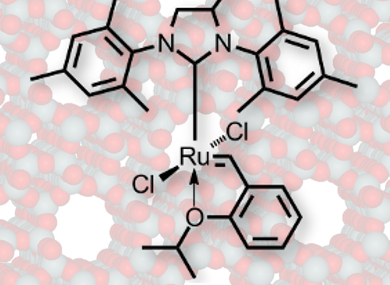Immobilizing catalysts on solid supports allows easy workup and recycling. Supporting ruthenium-based metathesis catalysts on polymers and mesoporous molecular sieves leads to highly active catalysts. The use of zeolites, in contrast, had not been considered because of their small pore size, which would make the reactive sites hard to access.
Hynek Balcar and colleagues, J. Heyrovský Institute of Physical Chemistry, Academy of Sciences of the Czech Republic, have immobilized Hoveyda–Grubbs type metathesis catalysts on lamellar (or two-dimensional) zeolites. In these zeolites, the crystals are only a few nanometers thick, and the pores are easily accessible. The ruthenium complexes could be fixed to the support without using a linker by mixing the zeolites with catalyst solutions and stirring the corresponding suspensions at room temperature.
The resulting hybrid catalysts showed good stability, low Ru leaching, and were reusable. The researchers tested the activity in the ring-closing metathesis of (−)-β-citronellene and N,N-diallyl-2,2,2-trifluoroacetamide, as well as in self-metathesis and cross-metathesis of methyl oleate. The zeolite-based complexes showed good activities comparable to a catalyst immobilized on mesoporous molecular sieves.
- Ru complexes of Hoveyda–Grubbs type immobilized on lamellar zeolites: activity in olefin metathesis reactions,
Hynek Balcar, Naděžda Žilková, Martin Kubů, Michal Mazur, Zdeněk Bastl, Jiří Čejka,
Beilstein J. Org. Chem. 2015, 11, 2087–2096.
DOI: 10.3762/bjoc.11.225




